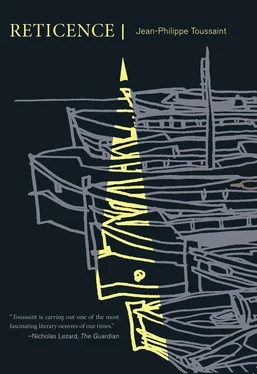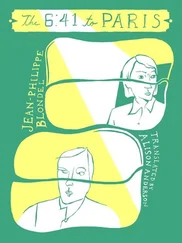Jean-Philippe Toussaint
Reticence
There was a dead cat in the harbor that morning, a black cat floating slowly on the surface of the water alongside a small boat. It was straight and stiff, and a decomposed fish head hung from its mouth out of which protruded a broken strand of fishing line two or three inches in length. At the time I’d simply imagined the fish head was all that remained of a piece of bait. The cat must have leaned out over the water to catch hold of the fish, and once he’d caught it the hook had become snagged in his mouth, he’d lost his balance and fallen in. The water in the port was very dark where I was, but from time to time I could make out a school of fish swimming silently down below, wrasse or mullet, while down at the bottom among the seaweed and stones swarming myriads of fry went at the gutted corpse of a decomposed moray eel. Before moving on I lingered for a moment on the jetty looking at the dead cat, which continued to drift slowly back and forth in the harbor, first to the left then to the right, following the imperceptible flux and reflux of the current on the surface of the water.
I’d arrived at Sasuelo at the end of October. It was autumn already and the tourist season was drawing to a close. A taxi had dropped me off with my bags and suitcases one morning on the village square. The driver helped me unfasten my son’s stroller from the roof rack on top of the car, an old 504 Diesel that he’d left running and whose motor continued to purr leisurely on the square. Then he’d pointed me in the direction of the only hotel in the vicinity, which I knew because I’d stayed there once already. I left my bags and suitcases near a bench and headed off toward the hotel with my son, who I’d sat in his stroller in front of me and who was oblivious to everything, absorbed as he was in the contemplation of his stuffed seal. This he examined from all sides, turning it over and over in his hands while burping unflappably from time to time with a royal disposition. A little flower-lined staircase led up to the hotel entrance with a double glass door, and I took the stroller in my arms and mounted the short flight of steps. No sooner had I pushed open the door than I found myself in the presence of the owner, who was squatting on the tiling with a cloth in his hands and now lifted his head suspiciously at the stroller I was still holding in my arms. Not knowing quite where to place it, as the floor seemed so clean and lovingly maintained, I held onto it and asked him if it would be possible to have a room for a couple of nights, three or four nights or perhaps more, until the end of the week, I wasn’t quite sure myself.
During my first few days in Sasuelo I spent my time taking long walks, sometimes along the narrow streets that led up to the neighboring villages, sometimes exploring the wild beach that stretched out for a mile or so behind the village. The sound of the wind and the waves blended in my mind as I walked slowly along the shore. It was an immense, deserted beach, continuously swept by swirling winds. I stopped and sat down on the sand from time to time and, while all around me filaments of dried seaweed blew toward the dunes, I absently collected a stone or two and threw them lazily into the sea. My son watched me with a biscuit in his hand, strapped firmly in his stroller by a little harness. Occasionally he leaned forward and tried to grab something or other that had washed up onto the beach, and as time went on I handed him everything he desired, beached pieces of driftwood shaped like strange talismans, pebbles, and twigs (as well as an old plastic sandal, whose sandy sole he kissed while letting out little squeals of joy).
Back at the hotel I spent hours lying on the metal bed in the center of the room. I did nothing and wasn’t waiting for anything in particular. The walls around me were humid and dirty, covered with old orange wallpaper that matched the dark flowers on the bedspread and curtains. I’d installed my son’s travel cot beside me in the room, a small and rather practical little folding bed fitted together with different-colored metal tubes to form a rectangular frame, a sort of little Centre Georges Pompidou erected beside my bags and suitcases in the dim light of the room. Sometimes, as my son slept peacefully with one little arm folded like a shield across his chest and his treasured plastic sandal placed carefully beside him in the cot, I got up and walked around the room in my socks. I went over to the window and lifted the curtain to look out onto the road, a deserted swath of road running along a weed-covered lot at the back of which, beside a desiccated fig tree bending under the weight of its dead branches, a solitary donkey grazed on fennel sprouts among various bits of refuse, old planks, abandoned tires, and an upturned rowboat that rotted where it lay.
To a certain extent if I’d come to Sasuelo it was to see the Biaggis. Until now, however, held back by a mysterious apprehension, I’d always put off the moment of going to visit them and steered clear of the area around their house when I went for walks in the village. Even on the day of my arrival, when I was still planning on going over to their place as soon as I’d got settled into the hotel, I’d stayed in my room all afternoon. Two days had now gone by since then and I was starting to wonder at the fact that I hadn’t yet bumped into them in the village, even if I’d been careful to avoid their house every time I went out. One evening, however, after lingering in the hotel dining room after dinner, I finally decided to drop in on them, very briefly I thought, just to say hello.
The Biaggis’ house was situated somewhat outside the village on the road leading up to the next hamlet. It was protected from the outside by a rather high stone wall, which was covered by a tangle of withered ivy that spread out from a thick network of gnarled gray roots and meandered along the rock. A few big trees, pines and palms, were planted here and there in the garden and could be made out through the gate leading into the property. Night had fallen now and the contours of the villa were visible in the shadows behind the bars of the gate. The house had gone up recently, it was long and low, fronted by a tiled terrace where a few pieces of white iron garden furniture had been left outside beside an enigmatic, dilapidated garden umbrella that lay half open on the ground. An old gray Mercedes was parked on the little gravel driveway leading over to the garage, and I noticed that the front fender was dented. I’d never seen the car before, and was just wondering what it was doing there when I heard a sound coming from behind the house, from behind the garage to be exact, like a falling rake immediately followed by hurried steps. I listened attentively but everything was silent around me. There wasn’t a sound in the night, and all of the shutters in the Biaggis’ villa were closed — as were the metal blinds over the bay window and the pale wooden shutters of the rooms on the first floor.
I stood there on the side of the road looking at the house for another moment, and was just about to go back to the hotel when I noticed a mailbox on the gate, hanging in the darkness at about chest height, fixed loosely to one of the bars with a twisted bit of wire. Even though it looked old and rusty the box was locked, and resisted when I tried to lift the little metal lid. I didn’t force it and, slipping my fingers into the crack, I had no difficulty removing the six letters inside. I examined them absently for a moment and saw that they were all very recent — the last one dating from October twenty-fourth — before putting two letters that looked like junk mail back into the box and keeping the others, which I slipped into my pocket. Of course, among the four I’d immediately recognized my own letter, which I’d posted from Paris a couple of days earlier. I could perfectly well have left it in the box, but perhaps there was no reason — no longer in any case — to leave a letter there announcing my presence in Sasuelo.
Читать дальше












